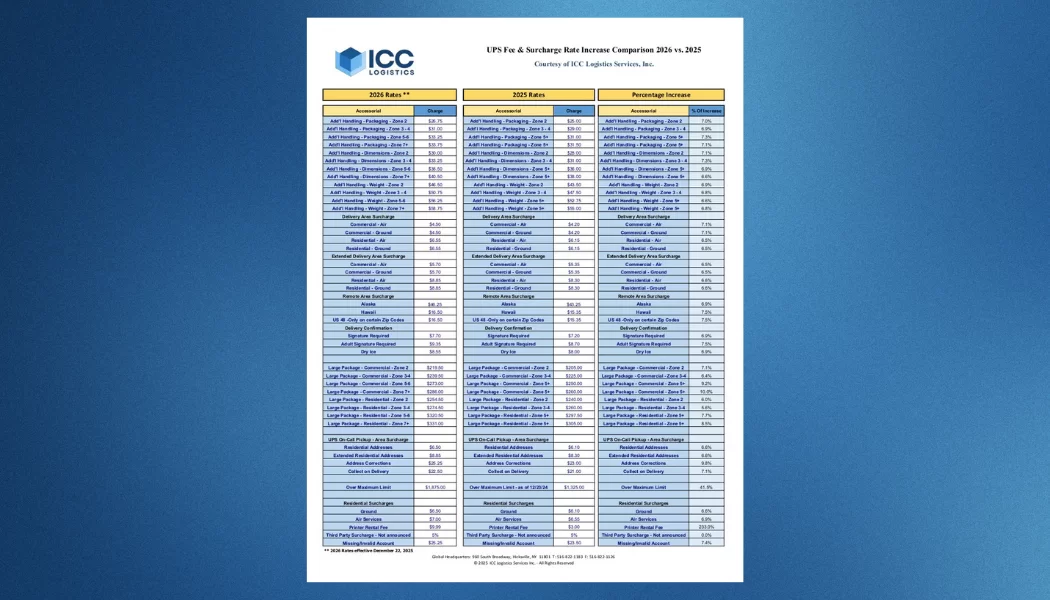For most organizations, transportation isn’t just another line on the P&L — it’s one of the largest controllable costs directly shaping profitability. Yet too often, invoice audits and contract reviews get pushed into the background as routine “back-office” work.
At ICC Logistics, we see it differently. With more than 50 years in the trenches, we know that freight audits, parcel audits, and carrier contract reviews are not clerical tasks. They’re strategic levers. When used correctly, they uncover hidden cost leaks, strengthen negotiating power, and create accountability across your supply chain.
Why Audits Belong in Your Shipping Strategy
An audit does more than catch mistakes after the invoice lands. It gives CFOs, supply chain executives, and logistics managers the visibility they need to understand the true cost of transportation. Done right, audits provide:
- A clear cost-to-serve view by carrier, service type, and mode
- Early warnings on margin erosion caused by repeated discrepancies
- Insights into how negotiated discounts get diluted by surcharges
Performance data that reveals which carriers keep — or miss — their commitments.
This intelligence turns shipping from a reactive cost center into a proactive strategy. Leaders can model “what-if” scenarios, benchmark performance, and walk into contract negotiations with facts instead of assumptions.
Freight Invoice Audits: Protecting High-Dollar Shipments
Freight invoices (LTL, TL, ocean, or air) are often packed with complexity. Accessorials like detention, reweighs, or fuel surcharges can quietly add up, and when left unchecked, they carve into margins.
A freight audit delivers:
- Immediate recovery of billing errors and overcharges
- Identification of recurring patterns that drive overspend
- Alignment with negotiated contracts, ensuring invoices reflect true terms
- Accurate cost-per-mile and cost-per-pound analysis for forecasting
With regular auditing, companies move from scrambling to recover dollars to proactively defending against expense creep.
Parcel Audits: Critical for High-Volume Shippers
Parcel invoices may seem “small” compared to freight, but the sheer volume makes them a hotbed for hidden overspend. Without automation and expertise, most errors simply go undetected.
Parcel audits help shippers recover and prevent costs by catching:
- Missed service failure refunds
- Incorrect or duplicate surcharges (DAS, residential, peak fees, etc.)
- DIM misapplications and billing discrepancies
- Zone- or geography-based spend inefficiencies
For eCommerce, DTC, and retail brands moving thousands of packages a week, these savings add up quickly. But the bigger win? Audit-driven insights help optimize your carrier mix and strengthen contract terms.
Carrier Contract Review: Ensuring Promised Savings Stick
Negotiating strong discounts is one thing. Making sure they actually show up on your invoices is another. Carrier contracts are layered with surcharges, minimums, and carve-outs that quietly eat into headline discounts.
A carrier contract review ensures that:
- Negotiated discounts and incentives are applied consistently
- Minimum charges and surcharges match contractual terms
- Policy shifts aren’t eroding negotiated benefits
- Margin creep is identified before it compounds
With this data in hand, shippers negotiate from a position of strength — not carrier-provided benchmarks.
Audits as Accountability
Carrier partnerships are built on trust, but trust needs verification. Audits act as a performance scorecard, holding carriers accountable for both billing accuracy and service levels.
This translates to:
- Credible data for CFOs and finance teams
- Procurement leverage built on facts, not assumptions
- Visibility into which carriers truly align with your long-term strategy
Integrated Auditing: Freight + Parcel + Contracts
The most effective shippers aren’t running audits in silos. They’re integrating freight, parcel, and contract analysis to build a complete view of spend and performance.
With an integrated approach, leaders gain:
- Benchmarking across all carriers and modes
- Shared dashboards for finance and logistics teams
- Real-world insights that feed directly into negotiation playbooks
This unified visibility doesn’t just recover past dollars — it prevents future losses.
Beyond Recovery: Preventive Savings
Traditional audits stop at error correction. Modern auditing goes further, spotting issues before they drain the budget.
Preventive audits uncover:
- Rate dilution — when discounts disappear under minimum charges
- Accessorial inflation — surcharges that escalate without warning
- Carrier creep — when a “convenient” carrier quietly overtakes shares despite a higher cost
By flagging these risks early, businesses build resilience and keep costs predictable.
Turning Audits Into Strategy
Audits aren’t just back-office hygiene. They’re one of the most cost-effective strategies for shippers to protect profit, strengthen carrier relationships, and build long-term resilience.
With ICC Logistics’ freight, parcel, and contract auditing services, companies can:
- Pinpoint and reduce overspend across modes
- Negotiate smarter with multi-year data
- Hold carriers accountable to their commitments
- Improve forecasting and budgeting accuracy
For 50+ years, we’ve helped shippers turn “routine audits” into competitive advantage. The result? Dollars back on the bottom line — and a stronger, more resilient supply chain.
FAQs
Why should audits be part of my shipping strategy?
Because they offer true visibility into costs, catch billing errors, and flag compliance issues before they eat into margins.
How do audits support contract negotiations?
They provide verifiable data, giving you the leverage to negotiate based on fact — not carrier models.
What’s the value of auditing carrier contracts?
It ensures discounts are applied, hidden surcharges are caught, and margin erosion doesn’t go unnoticed.
How do audits improve supplier accountability?
They provide a scorecard of billing accuracy, contract compliance, and service performance — all of which strengthen your position in negotiations.
Related Reading:
- Why a Freight Audit Should Be Your First Cost-Saving Move
- Benchmarking for Logistics Contracts: How Data Creates Carrier Negotiation Leverage
- Parcel Auditing vs Freight Auditing: What’s the Difference?
- What Hidden Clauses Should You Look For In a Shipping Contract?
- What’s The Process For Negotiating Better Freight Terms?



 to receive our FREE white papers:
to receive our FREE white papers: